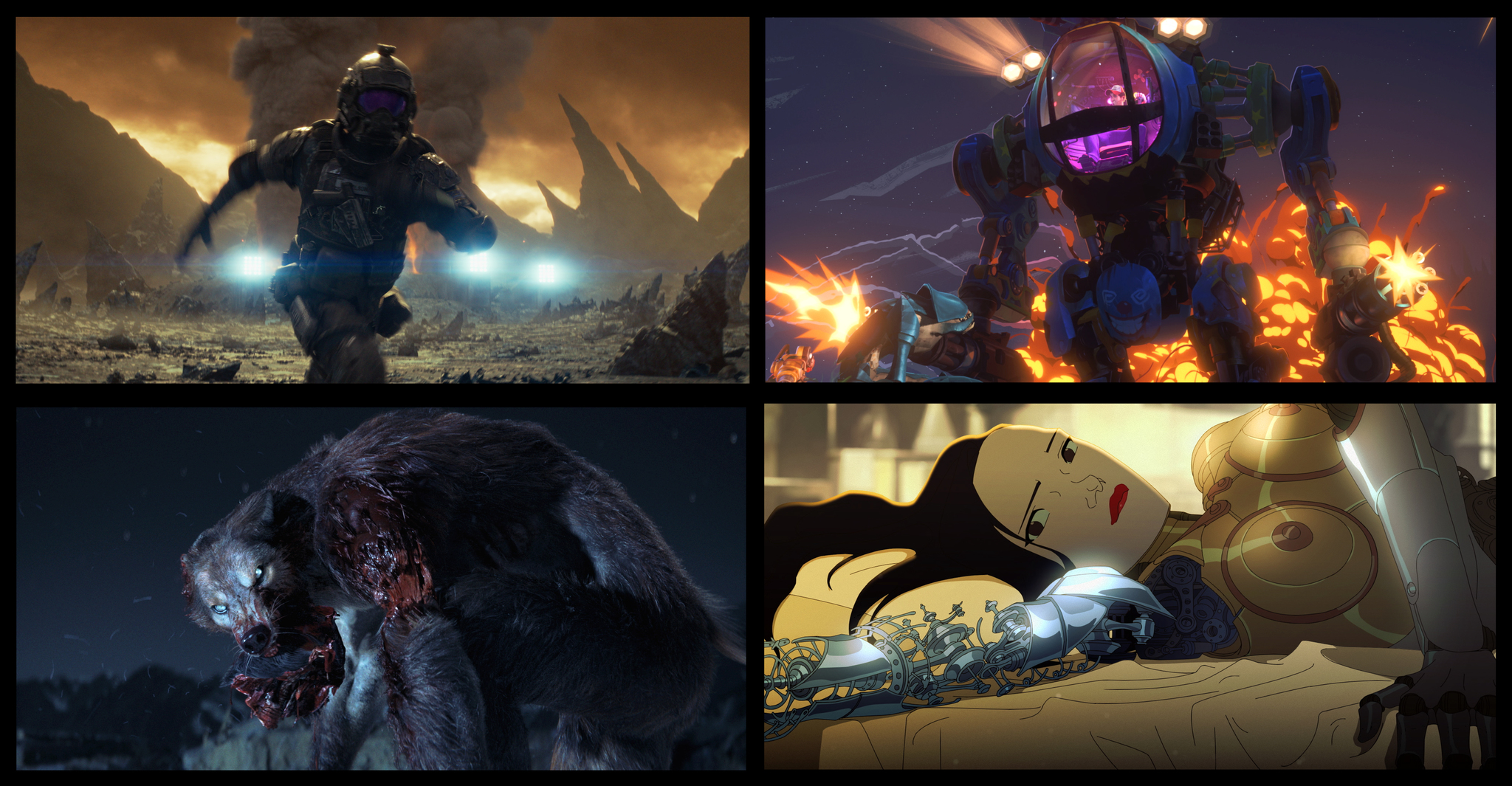At the end of August, Epic Games announced a partnership with the film production company Goldfinch. As part of the cooperation, they are holding a competition among games on Unreal Engine 4. The top 10 projects will receive film adaptations. We talked about cross-media in general and about the competition in particular with Alexey Savchenko, licensing manager of Epic Games.

Alexey Savchenko
Cross-media issues
Alexander Semenov, Senior Editor App2Top.ru : The reason for our conversation with you is the announcement of the partnership between Epic Games and Goldfinch. We’ll talk about it, but in the process. Let’s start with cross-media. You yourself wrote the other day that you “hit” on this topic.
Alexey Savchenko, Epic Games Licensing Manager: Hi! Yes, indeed, for about the last six months, in addition to licensing, I have been engaged in a number of projects at the intersection of the gaming industry, cinema, music, TV, comics and other IP-related niches of the entertainment sector.
The deal with Goldfinch is such a first trial swallow with the film industry. Let’s see what happens in the next couple of months.
The cross-media theme is awesome, but still not very typical for games. There are quite a few cases when the sayfai series immediately lives in books, comics, and desktop. As for games, there are much fewer examples. What do you think is the reason?
Savchenko: Firstly, from the point of view of the methodology of narration, a computer game is a much higher-level and complex basic material. Adapting it into any other product is much more difficult than a book or a movie.
Secondly, the gaming industry (historically) keeps itself apart from other sectors of the big entertainment. However, now this state of affairs is changing.
If you don’t go into details, how do you imagine a competent story on the work of games with cross-media?
Savchenko: The easiest way is to plan the game initially as an IP with the potential to develop into a franchise.
The idea should go the way of becoming from a story to a sufficiently detailed rich world with memorable characters, with the ability to scale. The game should at least hypothetically be enough for a book, a comic book and a board game.
These three products usually allow you to form a primary (extremely loyal) audience. Therefore, such an approach in general should be recommended for cultivation.
In the current conjuncture, the issue of product output (in case of its popularity) in games, movies, animation and TV is primarily a question of packaging. As for further success, it is already a matter of quality and understanding of what this primary audience needs.
But, by the way, there is a completely separate issue with music. No one fully understands how to go beyond the usual things from the field of “we wrote the soundtrack”. However, certain thoughts are inspired by music-oriented games and licensing of well-known tracks.

Resident Evil is an illustrative cross-media example. In addition to the blockbuster series, the franchise has board games and books.
To what extent does the primary product determine the cross-media that you can go to with this IP?
Savchenko: I mean, what area is he originally from? Essentially defines.
This is often a story in the spirit of: two steps back, one step forward.
If you have a good game on your hands, then before launching a movie, you still often need to make a book (one step back), then prepare a script together with the writers Guild (the second step back) from the book. Only after that it makes sense to apply to film production.
What do other industries think about games as a source of new IP?
Savchenko: The entire entertainment industry has been successfully selling IP licenses for a hundred years at lunch. This is a fairly large market, which is now extremely exhausted. Because of this, IP is often bought just to put it on the shelf and have it in the cache just in case.
The games here have quite a big and interesting chance to act as a supplier of supply to a market with huge demand.
But there is a curse of game adaptations. Most films based on games leave much to be desired.
Savchenko: I believe that any good idea should go through 3-4 phases of attempts on the market before becoming something cool. This applies to everything. This happened with VR, with AI, with neural networks. A bunch of large companies launched gaming directions unsuccessfully several times before doing something good. So it is with the film adaptations of games.
How to resolve this situation?
Savchenko: Content should be adapted by directors and producers who understand what video games are. Ten years ago there were few of them, now there are enough. Therefore, I think that today there are much more chances for good films based on games.
Before we talk about the history of Goldfinch, name, from your point of view, the main directions of cross-media in the gaming industry. Or at least possible growth points.
Savchenko: I will highlight the main ones with bullets.
- First. I am very interested to see what will happen “in the field” of music licensing and working with labels.
- Second. Hybrid projects. Absolutely all streaming services (Netflix, Amazon, Disney+ and so on) think in the direction of cross-media hybrid projects.
- The third. China and Asia are massively buying up IP in Europe.
- Fourth. Products in the spirit of Love, Death & Robots create an interesting conjuncture of springboards-accelerators for creating micro-IP.
- Fifth. Nastolki suddenly learned the best at crowdfunding to form a large and extremely loyal audience, accustomed to the ideas of offal from the very start.

Blizzard’s approach to Overwatch development can also be called cross-media. The company produced cinematics and comics about heroes and the universe.
Epic Games and Goldfinch
And so we got close to the announcement of the joint initiative of Epic Games and Goldfinch. Can this be called a competition?
Savchenko: In form, yes, in content, it is a tool. The initiative itself is an accelerated direct channel for submitting content to a film producer, who, in case of interest in IP, will take on the entire range of work related to adapting and preparing content in the right format to industry standards.
Is it wrong to say that Epic Games and Goldfinch are ready to shoot 10 tapes with live actors based on 10 games developed on the Unreal Engine?
Savchenko: Yes, not quite correct.
Look, Epic Games, for its part, provides the infrastructure of the process and helps to convey a message to developers. We also take part in the qualification of content at the level of expertise.
The owner of the initiative itself is Goldfinch, who wants to select 10 projects from the total stream this year and give them to production.
If everything goes well, then next year this story, I think, will repeat itself. Perhaps it will even grow in scale.
The organizer of the contest is investor Goldfinch. Can you tell us what the company is famous for and why it was decided to stop working with it?
Savchenko: We considered probably six or seven partners for the first deal. As a result, we decided to start with Goldfinch. They have an understanding of the market supply situation, as well as an understanding of the video game industry.
Their company also has a very wide range of activities. Take a look at their website. They are engaged in both production and production, and act as an incubator.
Their scale and scope almost perfectly fit the theme with games.
Who usually works with her from directors, studios and distributors?
Savchenko: I will simply get tired of listing a dozen permanent directors, more than twenty inhouse films, thousands of production contracts.
Of the last interesting — Killer Anonymous, shot by Martin Owen (Martin Owen), starring Gary Oldman (Gary Oldman) and Jessica Alba (Jessica Alba).

Killer Anonymous
The contest website says that games with “Engrossing universe” and “Memorable characters” are waiting. It sounds great, but the criteria are very subjective. How can the author (here — the developer) understand that this universe is really absorbing, unique, and this one is so-so?
Savchenko: To be honest, I don’t know how to answer this question. This is the film industry and entertainment, there have never been and will never be clear criteria. The question is partly empirical and generally from the field of holistic.
I recommend authors and developers to focus on the criterion actually mentioned: is there enough depth to make a book or a couple of dozen different stories in the world of the game, with the characters of the game. If yes, then it is worth filing.
I would also like to dwell on how the work on the film adaptations will be organized after the competition. Is there any understanding now how much both organizers of the contest are willing to spend or attract for future films?
Savchenko: I can’t really answer anything here, because each specific case in the case of cinema is a very separate story. It cannot be said that all 10 films will follow the same routes. I think after the contest, the winning authors will sign the NDA and receive proposals that they will discuss. What they will be, I do not know.
The website of the contest says that according to its results, things will be filmed in different television formats. How will it be decided that for such a game we will shoot a full-length meter, but for this one we will only get a web series for a couple of episodes?
Savchenko: This is also a question that is very difficult to answer.
I personally think that most of the proposals will go towards feature films. It’s logical and easy to start.
TV shows are always more difficult. There is a difficult market situation and more difficult conversations with distributors.
Yes, short films should not be treated with slight contempt. For example, I would really like to see Love, Death & Robots, where there are 20 paintings made exclusively on UE4.

Love, Death & Robots
Should the developers who will be submitted count on some kind of crazy success?
Savchenko: Let’s be honest, we understand that 99% of this is a relatively niche story. The lion’s share of products that will be released as part of this and future similar programs will not become conditional new “Avengers”.
Our task is to give developers the levers and tools so that they can not just release one game, but build six or seven products around their IP. So they will be able to expand their audience, conditionally, by 2-3 times due to “cross-pollination”. Then, perhaps, they will make the second part of the game, and thanks to the already known IP, 60-70% more people will buy it.
Of course, I would like to hope for cases when particularly smart teams will be able to:
- make a forecast for the development of the audience;
- adapt products by territories and niches;
- break into the big leagues.
However, you should not count on this in advance.
Last question. Name your favorite gaming cross-media that grew out of games.
Savchenko: I really like the movie series Resident Evil (she is wildly successful at the same time). Also, of course, Silent Hill. This is probably just the best film adaptation of the games.
As a child, the great Mortal Kombat came with an equally great soundtrack. For some reason, I remember Super Mario Bros. It’s about something else entirely, but it’s very cute. From the latter, in general, a good Warcraft.
